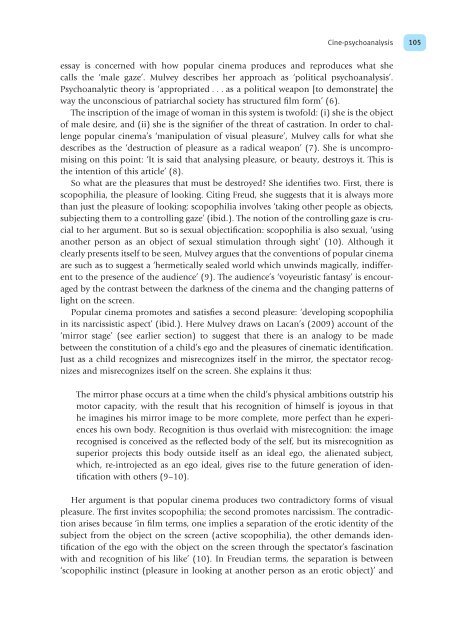Cultural Theory and Popular Culture
Cultural Theory and Popular Culture
Cultural Theory and Popular Culture
You also want an ePaper? Increase the reach of your titles
YUMPU automatically turns print PDFs into web optimized ePapers that Google loves.
Cine-psychoanalysis 105<br />
essay is concerned with how popular cinema produces <strong>and</strong> reproduces what she<br />
calls the ‘male gaze’. Mulvey describes her approach as ‘political psychoanalysis’.<br />
Psychoanalytic theory is ‘appropriated . . . as a political weapon [to demonstrate] the<br />
way the unconscious of patriarchal society has structured film form’ (6).<br />
The inscription of the image of woman in this system is twofold: (i) she is the object<br />
of male desire, <strong>and</strong> (ii) she is the signifier of the threat of castration. In order to challenge<br />
popular cinema’s ‘manipulation of visual pleasure’, Mulvey calls for what she<br />
describes as the ‘destruction of pleasure as a radical weapon’ (7). She is uncompromising<br />
on this point: ‘It is said that analysing pleasure, or beauty, destroys it. This is<br />
the intention of this article’ (8).<br />
So what are the pleasures that must be destroyed? She identifies two. First, there is<br />
scopophilia, the pleasure of looking. Citing Freud, she suggests that it is always more<br />
than just the pleasure of looking: scopophilia involves ‘taking other people as objects,<br />
subjecting them to a controlling gaze’ (ibid.). The notion of the controlling gaze is crucial<br />
to her argument. But so is sexual objectification: scopophilia is also sexual, ‘using<br />
another person as an object of sexual stimulation through sight’ (10). Although it<br />
clearly presents itself to be seen, Mulvey argues that the conventions of popular cinema<br />
are such as to suggest a ‘hermetically sealed world which unwinds magically, indifferent<br />
to the presence of the audience’ (9). The audience’s ‘voyeuristic fantasy’ is encouraged<br />
by the contrast between the darkness of the cinema <strong>and</strong> the changing patterns of<br />
light on the screen.<br />
<strong>Popular</strong> cinema promotes <strong>and</strong> satisfies a second pleasure: ‘developing scopophilia<br />
in its narcissistic aspect’ (ibid.). Here Mulvey draws on Lacan’s (2009) account of the<br />
‘mirror stage’ (see earlier section) to suggest that there is an analogy to be made<br />
between the constitution of a child’s ego <strong>and</strong> the pleasures of cinematic identification.<br />
Just as a child recognizes <strong>and</strong> misrecognizes itself in the mirror, the spectator recognizes<br />
<strong>and</strong> misrecognizes itself on the screen. She explains it thus:<br />
The mirror phase occurs at a time when the child’s physical ambitions outstrip his<br />
motor capacity, with the result that his recognition of himself is joyous in that<br />
he imagines his mirror image to be more complete, more perfect than he experiences<br />
his own body. Recognition is thus overlaid with misrecognition: the image<br />
recognised is conceived as the reflected body of the self, but its misrecognition as<br />
superior projects this body outside itself as an ideal ego, the alienated subject,<br />
which, re-introjected as an ego ideal, gives rise to the future generation of identification<br />
with others (9–10).<br />
Her argument is that popular cinema produces two contradictory forms of visual<br />
pleasure. The first invites scopophilia; the second promotes narcissism. The contradiction<br />
arises because ‘in film terms, one implies a separation of the erotic identity of the<br />
subject from the object on the screen (active scopophilia), the other dem<strong>and</strong>s identification<br />
of the ego with the object on the screen through the spectator’s fascination<br />
with <strong>and</strong> recognition of his like’ (10). In Freudian terms, the separation is between<br />
‘scopophilic instinct (pleasure in looking at another person as an erotic object)’ <strong>and</strong>
















